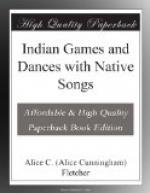This ancient American ceremony should live anew with us wherever we gather to enjoy the delights of nature in goodly company.
Directions.—It may be difficult to prepare a young tree for the central pole after the manner of the Omaha; if so, a space around a single tree can be made to serve. Bands of red and black muslin or paper should be put about the tree trunk; these are to symbolize the days and nights enjoyed during the camp life. The members of the camp should be divided into groups and each group have a name and a color. Small branches should be gathered, equal in number to those who will take part in the dance. If actual branches are not available, wands can be used; to these fluttering decorations of green paper should be attached, also a streamer the color of the group. Each group should be assigned a place in the wide circle that is to be made about the tree.
When all are ready the following Call should be sung. The Indian words are retained, as they are easy to pronounce and fit the meaning, and are adapted to the long echoing cadences of the Call.
Song No. 1
THE CALL
Zha-wa i-ba i-ba e-he,
Zha-wa i-ba i-ba ha e-he.
[Music]
[Words: Zha-wa = to rejoice; i-ba = come; ha = vowel prolongation of the syllable ba; e-he = I bid you. “I bid you come to rejoice.”]
This English translation of the native words does not convey the stirring appeal of the Omaha: “To rejoice! Come! I bid you.” The stress of the music of the Call is on “Zha-wa,” to rejoice; the notes which carry the words “e-he,” “I bid you,” seem to float afar as if to reach the most distant member of the tribe with the summons. The cadence of the Call echoes itself, as the second line is like the first, only lower in tones.
When all of the camp have gathered in response to the Call, each group must stand in its appointed place and every member hold a decorated wand. Four beats of the drum are now to be given; the beats must not be loud or rapid. When the reverberations of the drum cease, absolute quiet must be maintained, each one’s wand must hang downward from his right hand, while the following chant is given, sung by the leaders of the groups. The words are by John B. Tabb, the music is arranged from the Omaha invocation.
Song No. 2
INVOCATION
All that springeth from the sod,
Tendeth upward unto God;
All that cometh from the skies,
Urging it anon to rise.
[Music]
This chant takes the place of the prayer sung at this point of the ceremony by the Omaha Keepers of the Tribal Sacred Pipes. The prayer in the original has no words, vocables only are used, for the music is what carries the appeal to Wakon’da (God).
At the close of the chant two strokes of the drum should be given. Then the leaders should sing the first line of the following song; all the camp respond at the beginning of the second measure, and the song follows. This music is the dance song of the ceremony when all the Omaha tribe made four rhythmic advances toward the sacred tree, stopping at the close of each advance. The song was sung four times, once for each forward movement.




